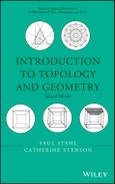An easily accessible introduction to over three centuries of innovations in geometry
Praise for the First Edition
“. . . a welcome alternative to compartmentalized treatments bound to the old thinking. This clearly written, well-illustrated book supplies sufficient background to be self-contained.” - CHOICE
This fully revised new edition offers the most comprehensive coverage of modern geometry currently available at an introductory level. The book strikes a welcome balance between academic rigor and accessibility, providing a complete and cohesive picture of the science with an unparalleled range of topics.
Illustrating modern mathematical topics, Introduction to Topology and Geometry, Second Edition discusses introductory topology, algebraic topology, knot theory, the geometry of surfaces, Riemann geometries, fundamental groups, and differential geometry, which opens the doors to a wealth of applications. With its logical, yet flexible, organization, the Second Edition:
- Explores historical notes interspersed throughout the exposition to provide readers with a feel for how the mathematical disciplines and theorems came into being
- Provides exercises ranging from routine to challenging, allowing readers at varying levels of study to master the concepts and methods
- Bridges seemingly disparate topics by creating thoughtful and logical connections
- Contains coverage on the elements of polytope theory, which acquaints readers with an exposition of modern theory
Introduction to Topology and Geometry, Second Edition is an excellent introductory text for topology and geometry courses at the upper-undergraduate level. In addition, the book serves as an ideal reference for professionals interested in gaining a deeper understanding of the topic.
Table of Contents
Preface ix
Acknowledgments xiii
1 Informal Topology 1
2 Graphs 13
2.1 Nodes and Arcs 13
2.2 Traversability 16
2.3 Colorings 21
2.4 Planarity 25
2.5 Graph Homeomorphisms 31
3 Surfaces 41
3.1 Polygonal Presentations 42
3.2 Closed Surfaces 50
3.3 Operations on Surfaces 71
3.4 Bordered Surfaces 79
3.5 Riemann Surfaces 94
4 Graphs and Surfaces 103
4.1 Embeddings and Their Regions 103
4.2 Polygonal Embeddings 113
4.3 Embedding a Fixed Graph 118
4.4 Voltage Graphs and Their Coverings 128
Appendix: 141
5 Knots and Links 143
5.1 Preliminaries 144
5.2 Labelings 147
5.3 From Graphs to Links and on to Surfaces 158
5.4 The Jones Polynomial 169
5.5 The Jones Polynomial and Alternating Diagrams 187
5.6 Knots and surfaces 194
6 The Differential Geometry of Surfaces 205
6.1 Surfaces, Normals, and Tangent Planes 205
6.2 The Gaussian Curvature 212
6.3 The First Fundamental Form 219
6.4 Normal Curvatures 229
6.5 The Geodesic Polar Parametrization 236
6.6 Polyhedral Surfaces I 242
6.7 Gauss’s Total Curvature Theorem 247
6.8 Polyhedral Surfaces II 252
7 Riemann Geometries 259
8 Hyperbolic Geometry 275
8.1 Neutral Geometry 275
8.2 The Upper Half Plane 287
8.3 The HalfPlane Theorem of Pythagoras 295
8.4 HalfPlane Isometries 305
9 The Fundamental Group 317
9.1 Definitions and the Punctured Plane 317
9.2 Surfaces 325
9.3 3Manifolds 332
9.4 The Poincar´e Conjecture 357
10 General Topology 361
10.1 Metric and Topological Spaces 361
10.2 Continuity and Homeomorphisms 367
10.3 Connectedness 377
10.4 Compactness 379
11 Polytopes 387
11.1 Introduction to Polytopes 387
11.2 Graphs of Polytopes 401
11.3 Regular Polytopes 405
11.4 Enumerating Faces 415
Appendix A Curves 429
A.1 Parametrization of Curves and Arclength 429
Appendix B A Brief Survey of Groups 441
B.1 The General Background 441
B.2 Abelian Groups 446
B.3 Group Presentations 447
Appendix C Permutations 457
Appendix D Modular Arithmetic 461
Appendix E Solutions and Hints to Selected Exercises 465
References and Resources 497








